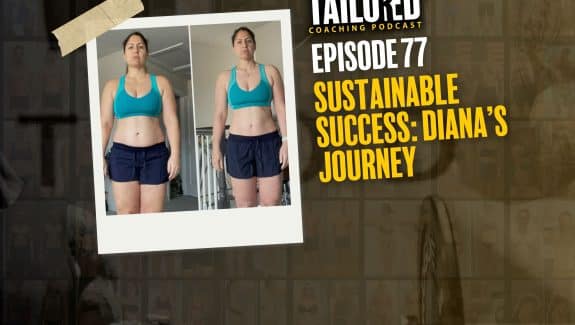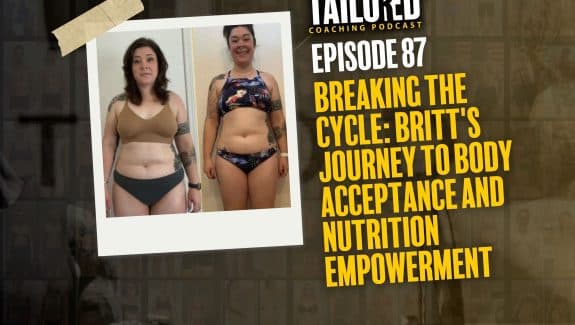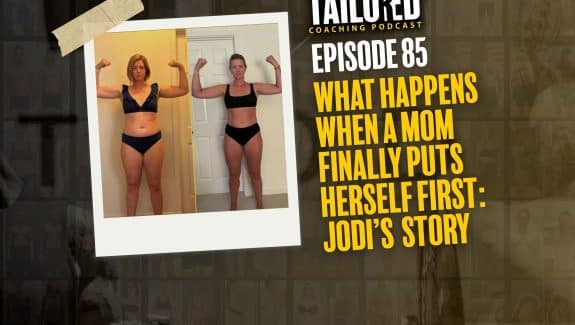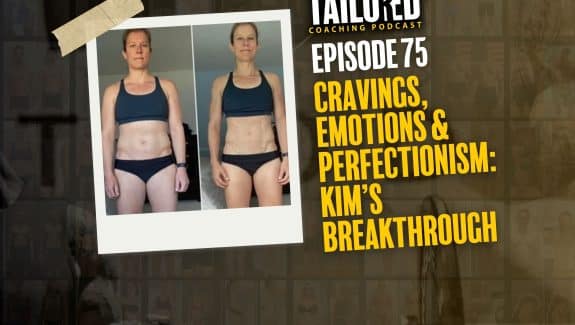Raise your hand if you’ve ever had someone tell you how amazing Intermittent Fasting is?
The idea of restricting all of your meals to a specific part of the day has become more and more popular in recent years as a health and fat loss protocol, but intermittent fasting is actually not a new concept.
Hunters and gatherers used to fast intermittently since food was not always available, and people have been practicing different fasts for religious purposes since the dawn of time.
Despite the current popularity of fasting today, it is NOT the magic solution for fat loss or maintaining your body weight. It is a tool that can be useful, depending on the individual, by helping control calorie intake.
But first things first…
What is Intermittent Fasting?
Intermittent Fasting (IF):
Abstaining from food periodically. This is a very broad term that could refer to alternate day fasting or fasting one day each week. The most common style of Intermittent Fasting is a 5:2 approach, fasting a full 24 hours twice each week.
In my experience when people say “IF” they should actually be using the term Time Restricted Eating most of the time.
Time Restricted Eating (TRE):
Eating all of your meals within a specific time frame of the day and abstaining from food consumption the rest of the day. Most commonly, fasting for 16 hours (overnight and in the morning) and eating for 8 hours. Time restricted eating can be practiced one or more days per week, depending on how your body responds.
Time restricted eating has risen in popularity recently as a weight loss diet for the general population. One major draw to this type of “diet” is that there are few rules and guidelines. There is no specification on what to eat, but only when to eat.
With time restricted eating, you don’t necessarily have to count/track calories, all you do is restrict your eating to one period of the day, typically eating for only 6-8 hours.
Some people who love time restricted eating prefer abstaining entirely from eating (fasting for a portion of the day) compared to restricting food choices throughout the entire day.
Does it Work?
The question on everyone’s mind, then, is – does time restricted eating work as a fat loss tool?
First off, no single diet plan will work for everyone because everyone is different. But let’s just assume that we’re all the same and we want to try out time restricted eating…
If you used to eat for 12 or more hours throughout the day and you are cutting your window of eating almost in half, I think it’s safe to assume that you will be skipping a meal.
If you indeed are skipping a meal, or even a snack ,when you undertake a time restricted eating protocol, then you are decreasing your food/calorie intake.
If you are decreasing calorie intake, you are putting yourself in a calorie deficit.
So let’s ask that question of if it works in a different way.
Does time restricted eating create a calorie deficit?
Most likely, yes. And if a calorie deficit is created, fat loss will occur. But this is also why any diet that decreases calorie intake will lead to fat loss – at least in the short term.
The key to any successful diet is creating a calorie deficit.

What Does the Science Tell Us?
Time restricted eating protocols have indeed been studied, but most studies have had a small number of participants or have been done on animals rather than humans.
One such small study found that time restricted eating led to weight loss and improved blood pressure for obese adults after 12 weeks of eating in only 8-hour time blocks.1 Similar studies on rodents showed weight loss, too.2
However, a 2017 review of these studies showed that the weight loss from time restricted eating was no different than restricting daily calories without the limitations of a specific eating time frame.3
This emphasizes my earlier point that a calorie deficit is a calorie deficit and no matter what causes that deficit (fasting, a decrease in your macros, or even “cleanses”), you will lose weight if you are taking in less energy (food) than you expend.
Is Time Restricted Eating The Best Option?
While IF/time restricted eating is certainly trendy, a nutrition protocol that includes fasting is not going to be the best option for everyone.
→ I would NOT recommend any type of fasting protocol in your nutrition plan if any of the below describe you.
→ I train at high intensity/volume multiple days each week
→ I live a high stress lifestyle with a demanding job & schedule
→ I have a hard time eating enough
→ I’m working on improving my hormonal imbalances
→ I like to eat balanced meals throughout the day
The main reason being that fasting is a form of stress on the body.
Small doses of stress can be great, but if you already train hard multiple days each week, have a stressful job, don’t sleep a full 7 hours each night, etc. then adding the additional stress of fasting is not going to support your overall health or your training or fat loss goals.
Additionally, if you enjoy eating throughout the day and that’s what works best with your schedule and macro targets, why change that? Personal preference always plays a role in nutrition because the more you enjoy something, the more consistent you will be over time.
Now on the other hand, time restricted eating could be a great tool for you to use if any of these describe you:
→ I prefer skipping a meal to have larger meals later
→ I have a great stress:recovery ratio
→ I don’t want to track food for a period of time, but want to control calorie intake (i.e. while traveling)
→ I can’t commit to tracking macros/calories consistently
For example, I have often recommended restricting food to one part of the day for my clients who travel often. This way, they can have more flexibility in their eating window which is very helpful if they can’t control what food is available.
And while tracking macros is one of the best ways to know exactly what and how much you’re eating, people who struggle with tracking consistently could potentially benefit from a time restricted eating protocol to help them control calorie intake.
If you decide to experiment with any type of fasting, I recommend reaching out to your doctor beforehand to make sure it is a safe option for your health.
Will I Lose Muscle While Fasting?
Great question! And only more research can give us a solid answer…
When fasting diets have been studied, the main variable researchers are looking at is weight loss, but not necessarily fat vs. muscle loss.
When we lose weight on any diet, there is usually a mix of fat and muscle lost. That is one reason I tend to recommend a high protein macronutrient ratio during a diet phase, to help preserve muscle mass.
Unfortunately, the jury is still out on whether or not fasting can hurt your gainz. Some studies have suggested that muscle mass won’t change using a time restricted eating approach to dieting, while others have shown small amounts of lean mass lost.5
What we DO know is that fasting is not going to be the best approach for you if gaining muscle is your goal.
To gain size, you have to take in more calories than you are burning. This is very difficult if you are restricting your eating habits in any way. It is also going to be more difficult to get in adequate protein to support muscle protein synthesis if following a fasting protocol.
It’s not impossible to gain mass when restricting your feeding window, but it’s safe to say that it would be less than optimal.
Fasting for Women
Women tend to have less resilient hormones than men and therefore can be more sensitive to the stress from fasting, exacerbating any underlying hormonal issues.
I would never recommend fasting to anyone who has hormonal imbalances they’re working through, and I typically don’t recommend any type of time restricted eating to women in general.
Like I mentioned above, fasting is an additional stress and some medical experts have even said that, for women, fasting can make symptoms of PMS and adrenal dysfunction worse.
Us ladies have naturally fluctuating hormones throughout our monthly cycles as well as our lifetime, going from puberty through menopause.
Because our hormones fluctuate so much and mainly because we have the badass responsibility for creating life, our bodies are more sensitive to stress. A woman’s body will not flow through proper hormonal cycles if it deems your lifestyle situation to be too stressful to bring a baby into the world.
If you are struggling with any hormonal issues, opt for balanced meals throughout the day, each with protein and healthy fats, to support your adrenals and blood sugar levels.
More on hormone health HERE.
Prolonged Fasting
There are other fasting options besides IF/time restricted eating if health and longevity is your goal more so than fat loss.
Prolonged Fasting is defined as fasting that is not intermittent and does not have to be done in any sort of cycle, but is done for at least 48 hours or longer. Typically, when people mention prolonged fasting they are speaking of a 3-5 day fast, consuming zero calories. Prolonged fasts should be done less frequently, one to four times per year.
Animal studies have shown chronic calorie restriction to improve lifespan by 40% as well as eliminating or reducing disease. Now, most of us don’t want to live with constant food restriction, so how would we reap similar benefits?
Dr. Valter Longo specializes in researching periodic prolonged fasts, where we attempt to get the health benefits without constant deprivation. Dr. Longo’s research has shown that effects from a 3-5 day fast including blood pressure, metabolism, insulin sensitivity, and inflammation improvements can persist for up to six months after the fast.
Fasting has also been linked to promoting death of damaged cells (autophagy) and also cell regeneration. Animal studies by Dr. Longo and one small human trial have shown prolonged fasting (2-4 days abstaining from food) to reboot the immune system and rid the body of damaged cells.
If you already eat a diet that avoids processed foods, alcohol, gluten, and other inflammatory foods, and manage your stress and sleep well, you might be ready to try a fast. Here’s how we recommend you start your experiment with fasting:
→ Start with 1-2 days per week of time restricted eating. Try this out for a few months and see how you feel. Remember, fasting is not for everyone. It’s 100% OK if you don’t like time restricted eating and prefer eating full meals throughout the day.
→ If time restricted eating goes well for you, later you may want to move onto experimenting with one 24-hour fast per month or every other month.
> Do you notice any benefits? Pay attention to your biofeedback as you experiment and continue to work with your coach and healthcare professional.
→ Next – if you’ve had success with time restricted eating and day long fasts, you might want to try a prolonged fast.
> The weeks before any fast, be sure to limit any processed or inflammatory foods to help your body ease into your fast.
> Do NOT think of your fast as a time when you can binge on junk and then fast it out of your system. I recommend you avoid fasting completely if you struggle with a “binge and restrict” mentality.
> Again, work with professionals you trust before embarking on a prolonged fast.
The Takeaway
Time restricted eating is a tool that you can use to help you control calorie intake, just like tracking your macros. It can be a very useful tactic for some people who can’t track their food intake consistently by helping them stick to a calorie deficit, but it’s not a “magic diet” that’s applicable to everyone.
You are a unique individual that should have a nutrition plan that works specifically for you, your lifestyle, and your goals. Reach out to a BBP coach today to get started with your individualized nutrition protocol!
Sources
- Effects of 8-hour time restricted feeding on body weight and metabolic disease risk factors in obese adults: A pilot study. https://content.iospress.com/articles/nutrition-and-healthy-aging/nha170036
- Is time-restricted eating effective for weight loss? https://www.medicalnewstoday.com/articles/322365.php
- International society of sports nutrition position stand: diets and body composition. https://www.ncbi.nlm.nih.gov/pmc/articles/PMC5470183/
- Is Intermittent Fasting Really The Healthiest Way To Eat? Not For Everyone. https://www.forbes.com/sites/serenaoppenheim/2019/01/24/is-intermittent-fasting-really-the-healthiest-way-to-eat-not-for-everyone/#925bf143606b
The “Leangains” Intermittent Fasting Study Is Finally Here. https://www.strongerbyscience.com/intermittent-fasting-study/




























































































































































































































































































































































































































































































